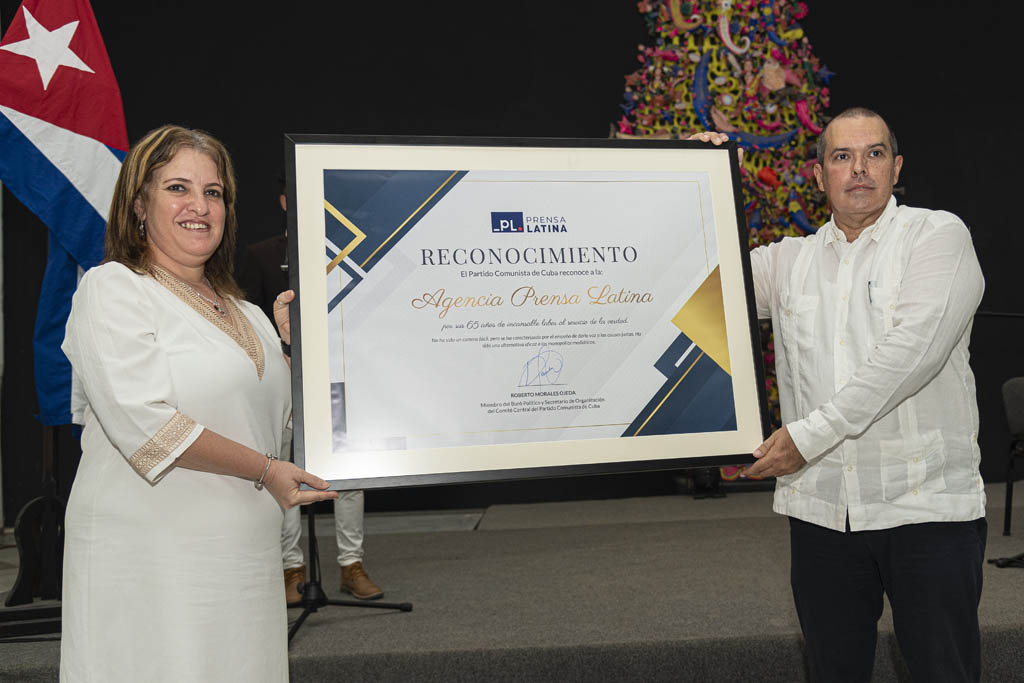This was recognized this Friday by the vice head of the Ideological Department of the Central Committee of the Communist Party of Cuba, Marydé Fernández, during the commemorative event for the agency’s 65th anniversary.
Below Prensa Latina transmits in full the speech of the vice head of the Ideological Department of the Central Committee of the Communist Party of Cuba.
Comrades and colleagues:
History wanted us to celebrate the 65th anniversary of Prensa Latina on the same day that two of the most extraordinary men of the revolution were born. Both figures are worthy exponents of intransigence and revolutionary radicalism. From Maceo we learned that whoever tries to take over Cuba will only collect the dust of its blood-soaked soil if he does not perish in the struggle, and Che said the same regarding imperialism. We also remember Che today because together with Fidel they made it possible for this news agency to be born in 1959, and keep up its spirit of struggle and combat in these 65 years.
In the auditorium of the University of Caracas, Fidel, during his visit to Venezuela in January, 1959, expressed the need to counteract the confusionist campaigns of the enemies of the Latin American progressive movements.
On June 16, 1959, Prensa Latina was born, determined to enter international information flows with a vision of the world different from that of the media monopolies of that time, despite the disadvantage in financial and technological resources compared to its adversaries.
The coverage of Latin American news events and especially of the Cuban emancipation project; were priorities of the agency, which had the leader of the Cuban revolution, Fidel Castro, and Commander Ernesto Che Guevara as its main promoters, and Argentine journalist Jorge Ricardo Masetti, its first director, who considered that “it is cowardice to be impartial, because you cannot be impartial between good and evil.
As the story goes, “when the first cable dispatch with the PL identification was transmitted, on June 16, 1959, everyone stood in front of the machines to watch how the teletype operator ‘striked out’ the news and, the next day, they reviewed it carefully.
I eagerly scanned the pages of the newspapers to see that they were no longer only publishing cables with the acronyms AP and UPI. Thus began a fight to break the information monopoly.
Mechanical typewriters, the photographic cameras of that time, a shortwave radio to capture stations from neighboring countries, a Morse telegraph transmitter and two teletypewriters for international information traffic were the tools in that initial stage.
There is a lot of history in those early years. The name of the agency, a suggestion from Che. The presence of the journalist Gabriel García Márquez, on his way to becoming one of the great Latin American novelists, and the Argentine Rodolfo Walsh, who discovered the first signs that a force was being prepared in Guatemala to invade Cuba.
In terms of news, Prensa Latina was another expression of the Latin American vocation of the Cuban Revolution, as was Casa de las Américas, headquarters of the event for this anniversary, which also recently reached its 65th anniversary.
The Cuban people trust their media and journalists, revolutionary journalists are and will continue to be key actors to improve ourselves as a society and to mobilize citizens.
Operation Truth is more valid today than ever, because we have every right to confront the lie that is the antidote with which national unity has been forged, as our beloved Abel Prieto expressed: Prensa Latina is the weapon of the people against the empire.
A team of editors, editors, reporters, photographers, as well as correspondents and collaborators in more than 35 countries work in this effort, who nourish the information flow of Prensa Latina, supported by highly qualified engineers and technicians, who make it possible for the signal of the agency to travel the planet carrying messages on the most diverse topics, spreading the truth.
Almost 65 years after its foundation, Prensa Latina has a solid and modern structure that allows it to successfully insert itself into the complex and competitive world of international news agencies.
Prensa Latina is also an important publishing house with more than 20 periodical publications, some of which are its own and others made to order, it has an online radio station and a television studio, and it has active participation in digital networks.










